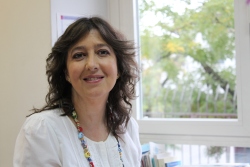|
What I Have Learned from Marginalized People and Communities
Valeria Méndez de Vigo
Social Justice and Ecology Secretariat
 My work in development cooperation began more than 20 years ago. However, previously, I was involved in volunteer projects where I had the opportunity to experience what I call "encounters" with realities and people plagued by poverty and exclusion. I remember when I spent one summer in India, many years ago now, collaborating in the work of the Missionaries of Charity. I gained so much from that experience that I would return there for the next five summers, while also getting involved in other activities in Madrid. A process of personal transformation was underway, bringing me closer to the realities of poor and marginalized people. This was not readily visible or dramatic, but these experiences changed my life and my career path; I left my job as a lawyer in a commercial law firm to join a development cooperation organization. My work in development cooperation began more than 20 years ago. However, previously, I was involved in volunteer projects where I had the opportunity to experience what I call "encounters" with realities and people plagued by poverty and exclusion. I remember when I spent one summer in India, many years ago now, collaborating in the work of the Missionaries of Charity. I gained so much from that experience that I would return there for the next five summers, while also getting involved in other activities in Madrid. A process of personal transformation was underway, bringing me closer to the realities of poor and marginalized people. This was not readily visible or dramatic, but these experiences changed my life and my career path; I left my job as a lawyer in a commercial law firm to join a development cooperation organization.
These poor and marginalized people taught me many things-lessons reaffirmed to me over the years. The first one may seem like a paradox: Poor and marginalized people, sometimes even illiterate, possess a very profound wisdom. This wisdom is not based on academia or cultivated knowledge, but it is rooted, vital, essential. From a faith perspective, it bears mentioning, as it says in the Gospel of Saint Matthew, that what God hides from the wise and learned, He reveals to ordinary people. God's plan-the transformation of God's love into the love of one's neighbour-manifesting in the words and actions of Jesus, is revealed first and foremost to ordinary people, those who in theory know nothing, those who are neglected by the world... I have seen this play out on many occasions, taking form in acts of solidarity and aid by marginalized people and communities. They likewise demonstrate this wisdom in their extraordinarily creative approaches to overcoming issues and difficulties.
The second insight or lesson I learned was of the tremendous strength and resilience of marginalized people and communities. I have been to very poor remote villages in Asia and Latin America, and to India after the Gujerat Earthquake and the tsunami, where I saw people's steadfastness, their enormous resilience to struggle in the face of adversity and very extreme conditions. Theirs is a cry of dignity; it is life itself forging a path, against all odds, to overcome death.
The third lesson is connected to the previous two. What I also learned, in a more personal sense, is that by going to the frontiers of this world, by going out to meet the suffering people, we connect more with our deepest, most intimate, and best selves. I like to think that we connect with our calling. Also, it is important to connect our inner world with the world outside, with our own interpretation of the world-informed by these encounters-and with the defence of the ever-violated rights of marginalized people and communities.
The fourth lesson came through the experience of working for more than 20 years in a variety of institutions, the last twelve in Jesuit organizations, most recently in the Social Justice and Ecology Secretariat. This fostered a deep conviction that working for justice requires a holistic response. Social transformation requires direct action, but a more structural focus is needed to move beyond the local level. To do this, we must encourage analysis and discussion on the factors that create poverty, inequality and exclusion for millions of people around the world, centred on the perspectives of marginalized people and communities themselves. We must globalize solidarity and just causes, universalize the struggle for rights, and intervene in the public sphere to generate structural and sustainable changes. What's more, marginalized people and communities themselves must guide our actions.
|